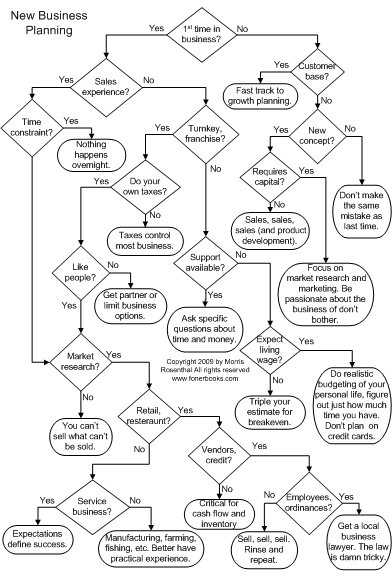Some business people come equipped with a built in time management system called "Gathering Resources Eases Expected Disasters" or GREED. If you're constantly worried about preparing for the future, greed is both a symptom and a coping mechanism. Some "greedy" people are actually very generous, raking it in with one hand and giving it away with the other even while planning their next business coup. In terms of remaining constructively self employed, a little greed may be good, because it helps keep your nose to the grindstone. I primarily keep busy with activities that have nothing to do with my business or generating income, so it could be I need a little more greed myself. One tool I've developed for managing my time is to speculate about new publishing business opportunities on this blog and then to do my best to follow up on them. The following flowchart a first attempt to crystallize some of the ideas from my blog post of two weeks ago about interactive books. The idea was to create the kernel of a non-linear business planning book for the newly self employed and explore its potential for a book.

This interactive business planning flowchart may end up in a book one day or it may never make it past the experimental stage, so click the chart and let me know what you think. I'm definitely glad I took the time to work on it now rather than pursuing some pie-in-the-sky options I had on the plate. It turned into one of those dual-use projects where I was writing not only for the potential audience, but also for myself. Often times, the act of putting something down on paper, sketching out some possible futures, is more valuable than discussing the same issues with a whole band of friends or peers. One of the things I learned from doing the work is that I'm not cut out to become millionaire. I've always been reluctant to suggest to my readers that there's a pot of gold at the end of the rainbow if they just do everything right. Now I find I've grown confident in telling people that the pot of gold is called "earning a living."
Too many authors who take up the profession full time fall into the trap of thinking they should spend the majority of their work day writing, and that any leftover time should go to creative exercises, inspirational activities or drinking themselves into a stupor. That might be just the right prescription for a fiction author on a roll, but for most of us, writing doesn't even come close to being our primary activity. And for many authors like myself, daily writing usually means blogging and correspondence, not working on a new book. I know self publishers whose chief employment is marketing and shipping books, which is a great way to to keep the business going. Others are extremely detail oriented, investing large chunks of time in designing their books, adapting them for different platforms, keeping up with industry developments and software.
Planning for self employment is not just about the big picture, about choosing a market opportunity that matches your skills and resources. Your plans should also take into account how you're actually going to employ your time on a day to day basis. I generally discourage self publishers from rushing to contract out production tasks and design work simply as an issue of cost control. But if you're like me, the mechanics of preparing and publishing books will actually take more time than writing them, and that helps keep me constructively employed.
One thing that I'd really like to try in coming years is binding my own books. Not as a production technique for volume sales, but as a way to do on paper the kind of market research I do with my online experiments. Book binding also sounds like a neat way of filling some of that down time that work at home sole proprietors inevitably face. I would have preferred a voice explaining the steps than the music and titles in the following video, but it still looks fun.
2 comments:
Ah ha...I knew I could be of use to someone one day!
Try some traditional bookbinding - or if no,t pay attention to what the guy says about the paper...
http://www.youtube.com/watch?v=hrHi-NhO4GI
Also this guy is fab:
http://www.youtube.com/watch?v=kAFTGO0hGKs
I'm partial to this guy's explanation of folding and binding, even though he can't count:-)
http://www.youtube.com/watch?v=CSpwvZzros8
But he straightens it out with an impressive on screen demo here:
http://www.youtube.com/watch?v=QKSkg9sCcuY
BTW, Blogger does let you link text in comments as I did above, but it also nofollows them automatically.
Morris
Post a Comment